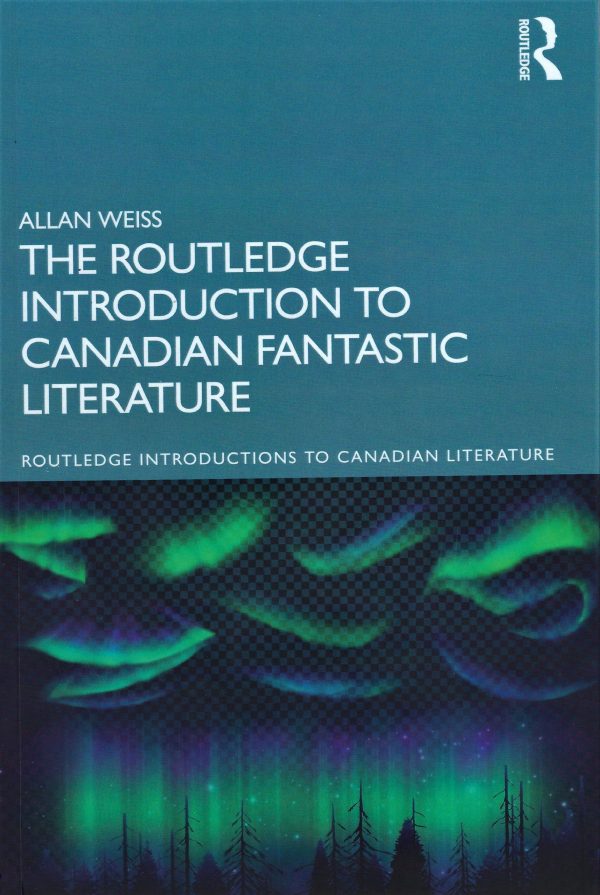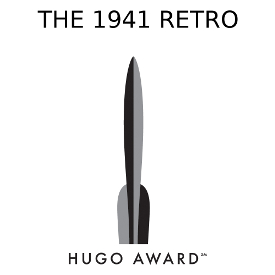
OBIR: Occasional Biased and Ignorant Reviews reflecting this reader’s opinion.

THE ROUTLEDGE INTRODUCTION TO CANADIAN FANTASTIC LITERATURE – by Allan Weiss
Publisher: Routledge, New York, NY, USA, 2021.
Premise:
“This history of fantastic fiction in Canada, then, will describe both its synchronic and diachronic features.”
Yep, that about sums it up. No one can accuse Weiss of pandering to the masses Harlequin-Romance-style. He’s an academic through and through. He’s an associate Professor of English and the Humanities at York University and a glutton for punishment for academic papers and conferences dealing with Canadian fantastica. Without him scholarship in Canada about Canadian SpecLit would probably be somewhere around the Neanderthal level. He’s a one-man educational institution (there may be others but I’m a one-man black hole of Ignorance myself), a major mover and shaper of academic opinion. Bit of a phenomenon he is, actually.
Thing is he knows what he’s talking and writing about. And he’s passionate about his obsession.
So, I figure he’s got interesting things to say and might even be fun to read. A perilous prediction for what is primarily a text-book overview, essentially a reference book, but since it’s not encyclopedic in format but rather a series of essays, I assume he’s bound to slip in some outlandishly perceptive observations good for a laugh. I mean, Hell, I would if I were writing it. Gotta keep the reader entertained, you know.
Mind you, in a SF Canada zoom meet I was hosting he commented, if I remember correctly, that the original manuscript was twice the length but the publisher insisted they wanted no more than 200 pages of teeny, tiny print. I mean, ghod, force a Professor to be concise and precise? How cruel! But I’m hoping he left the best bits in.
I’ve run out of time to read through a novel for review purposes, so instead I’m going to dip in and out of this non-fiction survey and see if I can find anything intriguing. I’m betting I will.
Review:
Not bloody Manuscript Found in a Copper Cylinder again! Every course in Canadian fantastica begins with that 1888 novel by James de Mille, a “satirical utopia” no better or worse than a bunch of others, but a first in Canada. Or was it?
According to Weiss the first piece of Canadian Fantastica, and incidentally the first Québécois novel, was L’influence d’un Livre (The Influence of a Book) by Phillipe-Aubert de Gaspé Jr. in 1837. Son of a gun. I did not know that. It’s very Catholic (as was and is Québec to this day). A young man endangers his immortal soul through fooling around with black magic and alchemy. Not quite my cup of tea. A bit preachy from the sound of it.
But the first Canadian science fiction (of sorts) came along in 1839 with Aimé-Nicolas Aubin’s Mon Voyage à la lune (My Trip to the Moon) in which the narrator gives his depressed horse some laughing gas mixed with hydrogen to cheer him up, and when the horse flies off into the sky the man gives himself and his dog the same gas mixture in order to retrieve the horse. Instead all three wind up on the moon whose inhabitants, the “Lunatiques,” are curiously similar (allegedly, for purposes of satire) to typical French Canadians. For example, the narrator saw (according to Jean-Louis Trudel’s translation) “astonishing things related to the science of passing judgement, exploiting, shaking down, pillaging, fleecing, bleeding, and knocking senseless, that is to say the art of governing people.” And a female Lunatique informs the narrator: “Justice? … We do not have just one justice. Our courts offer two: one for the rich and one for the poor. And so we can say there is justice for all.” This sounds like a spritely amusing satire.
However, Weiss claims (and I find this astonishing) that well beyond 1900 (when dystopias became all the rage elsewhere—a 20th century thing I guess) Canadian utopia fiction carried on as part of a growing sense of what being Canadian implied. Reducing his explanation to the nitty gritty, it was because of three concepts held dear by intellectuals of the day: 1) we are a young country with infinite potential for greatness, 2) we are a racially pure nation (i.e. white) and therefore more viral and strong than other countries, and 3) we have a divine mission to perfect Christianity and the Anglo-Saxon race. Consequently, we are destined to rule the world. Well, shit, so much for the modern myth of Canadians being humble and polite. Evidently our predecessors were a bunch of bastards or, at least, our intellectuals were. Interesting. Something of a revelation.
But mainly, these jerks were probably just boring. Ralph Centennius, nobody knows his real name, in his 1883 book The Dominion in 1983 wrote about “rocket trains” crossing the country in hours, but mostly about sociological perfection. He envisioned a combination of vigorous Canadian young men of outstanding moral strength and a “Society of Benefactors” without whom “our history, our manners, and customs, our whole career as a nation would simply have been a repetition of European civilization with all its defects, failures and vices.” As a result, all social ills, including high infant mortality, would have been resolved by 1983 and the vice of immigration would be thrown out and replaced by the natural reproductive vigour of racially pure Canadians, thus perfecting “our” race. So much so, that the Americans would fiercely admire us and clamour to join the “United Empire” where Canada was co-partner to Great Britain and eventually its superior. Seems our intellectuals were modest, too.
And racist. Spectacularly and insanely racist. Get a load of the 1908 article for the Canadian National Exhibition, titled Toronto in 1928 A.D. by Frederick Nelson, informing readers that Queen’s Park “had once appeared doomed. The Italians, the Chinese, the Jews and other foreigners had taken it as their own” but fortunately, by 1928, they had been confined to what amounts to a ghetto described thusly: “Such districts are often termed the resorts of the scum of the earth. Vicious Negroes of a low class; the Italian of the flashing knife; the Irish, French, American, English, Bohemian, Polish, Russian and German, and sad to say, even the Canadian who has seen better days.” A level of white racism so extreme it excluded white Americans and Brits. Seems only Canadians could form the world dominant master race, and not even all of them, just the better sort. Was this what Prime Minster Laurier had in mind when he declared “The 20th century belongs to Canada?” I hope not.
It is with some relief that I read that many a Canadian utopia was written by Methodist Ministers and their ilk and that they predicted a future where social needs were met to the common benefit of all and that Canada had united the world with a single vision of Christianity which the entire human race had willingly adopted. So we get to rule the world but in a nice way. This sounds more truly Canadian, though just a tad impossible. Still, mostly harmless, I guess.
As for bloody Manuscript found in a Copper Cylinder, Weiss states “The novel does not portray a better society but rather one that is bizarrely different and whose purpose is to ridicule British society and the Empire.” When I read it long ago I remember thinking it was pretty weird but I didn’t quite pick up on the satirical aspects, but Weiss makes them clear. For example, he points out that the leader of the lost civilization at the South Pole explains their habit of honouring those who kill the most people this way: “How could it be otherwise? Is it not the same with you? Have you not told me incredible things about your people? … You, with your pretended fear of death, wish to meet in battle as eagerly as we do, and your most renowned men are those who have sent most to their death.” Hmm, true enough. And then there is the local’s “belief that those in love should be kept apart” which is Imperial Puritanism encapsulated. Very much a British tradition. Next time I read de Mille’s book I’ll pay more attention.
The above bits I’ve gleaned from the opening essay “The Early Period” are but a small part of its contents. I’ll leave the sections on early SF (including early Canadian military science fiction) and fantasy for you to discover. But I have to admit, after reading about the racist ideology expounded in 19th and early 20th century Canadian utopian fiction, I feel the need for a shower to cleanse myself. Can’t say I found the first essay fun to read, but it was startlingly fascinating, way beyond what I had anticipated. Don’t ever let anyone tell you Canada wasn’t racist in the good old days. We damn well were, almost beyond belief. Unfortunately, some of us still are. It’s an ongoing battle. We have yet to live fully up to our reputation of being, nice, polite people. Got a long way to go in fact. But at least we are better than we used to be, I think. I hope.
Now, what can I discover in the essay “The Pulp Era?”
During this period the primary market was American pulp magazines. So most Canadian SF&F writers wrote and were published in that market. Authors like A.E. van Vogt and Lawrence Manning, for instance (both eventually moved to the USA). But this didn’t entirely put an end to Canadian publications. Hilda Glynn-Ward’s 1921 story (novel?) The Writing on the Wall has China and Japan working together to buy up land in British Columbia in order to take over the province. I doubt any American publisher would have been interested.
Québécois literature was probably undigestible for American readers as well. In Ubald Paquin’s 1926 novel Cité dans les fers a Freemason conspiracy led by Canada’s Prime Minister MacEachran sets out to destroy Québec’s Catholic French society, starting by seizing the assets of a convent. This leads to riots, quickly suppressed, which in turn leads to rebellion and the establishment of the Republic of Québec, only to be destroyed by the British navy and Québec’s politicians sent to firing squads. Not exactly a cheerful vision of the future.
Weiss emphasizes the intensely conservative nationalism of Québec at the time, with a particular emphasis on agrarian civilization and the threat “English” technology and capitalism posed to a godly and decent way of life. I was struck by what seems to me an obviously parallel to the Confederate States of America, whose ideology placed a profound stress on “civilized” agrarian life and a contempt for the technology-mad greedy capitalists typified by “damn Yankees.”
This is not to suggest that ideology rendered French Canadian fiction stolid and static. Armand Grenier’s 1944 novel Erres boréales (Northern Wanderings) suggested the key to preserving Québec’s way of life was to alter the climate and open up the northern section of the province to agricultural settlement. Agriculture is the true basis of society? Then double or triple the amount of land suitable for farming. Makes sense. In theory. But what about the cost of the infrastructure? And travel connections to the cities of the south? Problems which plague Canada to this day. Mind you, climate warming may accomplish Grenier’s vision for better or worse.
Utopias continued to be churned out. So many that Canadian humourist Stephen Leacock (often called Canada’s Mark Twain) wrote a Utopian spoof in 1932 titled Afternoons in Utopia: Tales of the New Time in which the man from the past is very blasé about the wonders of the future: “The chamber as I said was vast yet contained little furniture other than a few oaken tables and chairs of exquisite workmanship and design which I never recalled to have seen before. This, however, was not surprising as I have never worked in a furniture store.”
Homegrown lost worlds were a thing. In the SF Canada zoom meeting previously mentioned Allan Weiss described a Canadian novel in which, again if I remember correctly and I tend not to, a lost race is discovered in a domed city underneath a northern lake, an intelligent, superior race plagued by “Sea Gorillas” who had somehow wandered in from the Atlantic ocean and were something of a nuisance. I searched for mention of this gem as I scanned the book but couldn’t find it. Perhaps it was included in the material excluded from the final, reduced version.
Sea Gorillas puts me in mind of speculative evolution theory and that, too, was a thing. Many Canadian writers speculated on what the human race was involving into while others speculated we were devolving, our natural mental talents weakening under the enervating impact of modern life. But, as always, the vast expanses of our frozen north offer a refreshing salvation, even if currently overrun by giant white elephants, dinosaurs, and assorted mutants. Hmm, you don’t see that in the tourist brochures.
I have barely touched on the contents of “The Pulp Era” essay. I’d say most of it was new to me. Seems I have a very poor grasp of Canadian fantastica history. A close reading of this book would set that right.
I should mention that each essay begins with an overview of that era’s SF&F literature in general, and thus primarily that of Britain and America, followed by an overview of the Canadian trends, with everything in contemporary historical context, followed by analysis of individual writers, in some cases amounting to career studies. There’s a lot to unpack, but Weiss does a masterful job of uniting all the writers into a cohesive whole that makes sense in terms of movements and trends while at the same time giving you the impression you’ve come to know the writers as individuals.
For example, his essay “The Atomic Period” focuses on Phyllis Gotlieb. I know she was a major literary force, but have never actually read any of her books. According to Weiss she was a colossus standing over Canadian fantastica for something like half a century. Judging from his detailed analysis of her several trilogies and numerous short stories she tackled themes centred on what it means to be human. Her fiction sounds intellectually demanding. Not sure I’m up to it. But her writing also sounds inspiring and invigorating.
That’s one of the virtues of this book. Weiss presents capsule descriptions of books and stories clear and precise enough for you to decide whether or not you want to read writers previously unknown to you. For instance, his account of the 1962 story Akua Nuten (the South Wind) by Yves Thériault, a Québec First Nations writer, reads “The protagonist is a Montaignais living in Northern Québec. A nuclear war breaks out, and white refugees from the bombing of Montréal arrive by plane. The whites ask him to feed them and he tells them they are surrounded by plenty: all the game and fish they could need. Yet they arrogantly believe it his duty to serve them, especially if they pay, as if money means anything here and now. Remembering how whites have dispossessed and oppressed his people, he refuses to help them.” This sounds intriguing. Weiss has a knack for making you want to read everything he is talking about.
Weiss comments “We have seen that Canada did indeed have a tradition of fantastic literature, but this was largely invisible to Canadian culture as a whole.” However, writers in countries like the United States and England “had both local and international literary traditions and communities to draw on, and so the authors of fantastic literature who moved to Canada came out of a more encouraging cultural context.” This was a shot in the arm for Canadian fantastica. He’s referring to authors like Michael G. Coney, Judith Merril, Spider Robinson, Donald Kingsbury, H.A. Hargreaves, and William Gibson. Their contributions rejuvenated Canadian fantastic literature, pushed it in new directions, popularized it more than ever before, and created a readership demand which made it easier for dozens of new Canadian authors to get published.
I can remember, during the 1970s, when Canadian fans debated whether Canadian science fiction and fantasy even existed as a separate genre, citing the above authors as a kind of “foreign invasion” which perhaps prevented homegrown fantastica from emerging. In hindsight it appears the above mentioned “transplants” literally founded modern Canadian SF&F, at least to the extant of making it “respectable” to public and critics alike.
Later essay “chapters” explore the wide diversity of authors which have entered the Canadian scene since. In his final paragraph Weiss states: “It has become far more difficult in recent years to make generalizations about Canadian fantastic literature overall due to its increasing size and diversity. It was once possible to read all the works in the field, but that has become simply impossible. Furthermore, Canadian science fiction runs the gamut from the hard SF of Peter Watts to the social speculations of Candas Jane Dorsey; Canadian fantasy includes some of the best-known practitioners of heroic fantasy like Guy Gavriel Kay, urban fantasy like Charles de Lint, and paranormal romance like Kelly Armstrong, to name only a few. Surrealist, magic realist, and other ‘liminal’ forms remain vibrant. Above all, authors from previously silenced racialized and gendered communities have joined their voices to the chorus, making it even harder to offer blanket declarations about the field. We can only speculate (so to speak) where Canadian fantastic literature might go from here.”
CONCLUSION:
This book is eminently readable and rather addictive. It’s fun to read Weiss’ interpretations of books you’ve already read, but even more fascinating to read his views on books and writers you’ve never heard of. Compels you to compile lists of books you absolutely need to put on your bucket list. This reference book deserves a place on every book lover’s shelf. It is excellent.
On a personal note, my mother passed away in 1998 before I accomplished anything of literary note, yet she always encouraged me to keep trying. Reading this book and discovering at the end of a list of new publications contributing to the renaissance of Canadian fantastica the words “and R. Graeme Cameron started Polar Borealis in 2016” brought tears to my eyes. Mom always valued education, and in her mind being cited as a minor reference in an academic publication would have been proof that I “had made it.” She would have been so proud. Made my day that did.
Check it out at: < Guide to Canadian Fantastic Literature >











Recent Comments